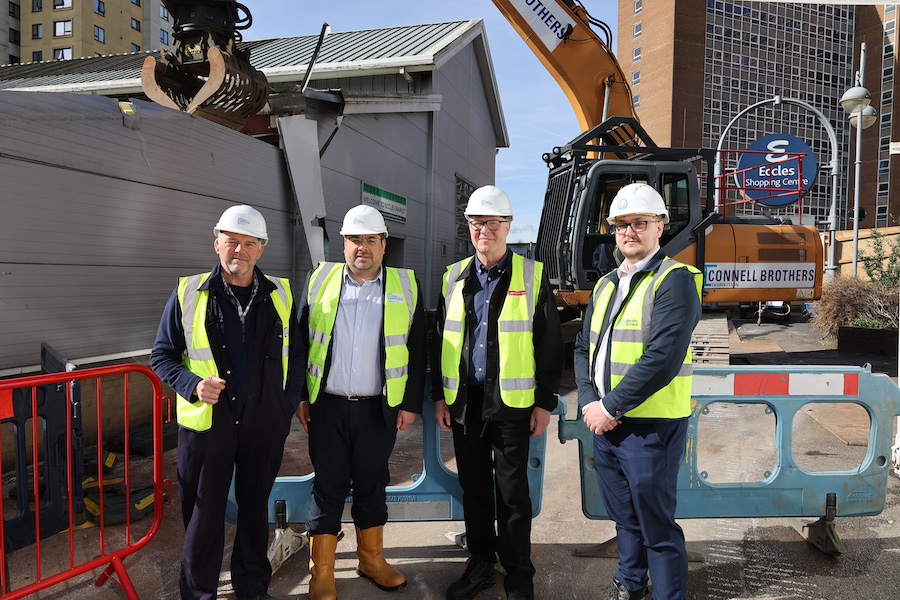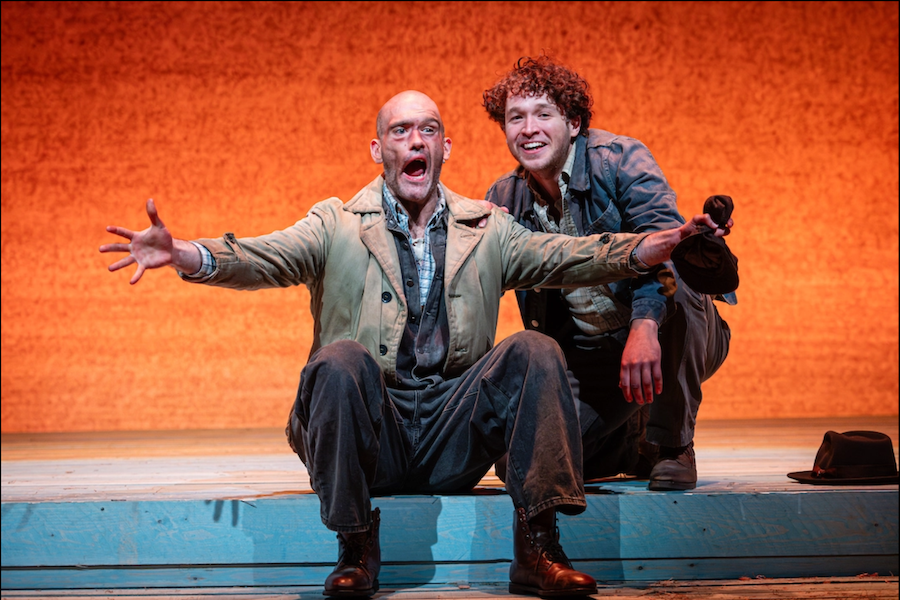The real story of the Peterloo Massacre uncovered – and why the memorial is just wrong
- Written by Emily Oldfield
- Last updated 2 years ago
- Community, Cornerstone, History
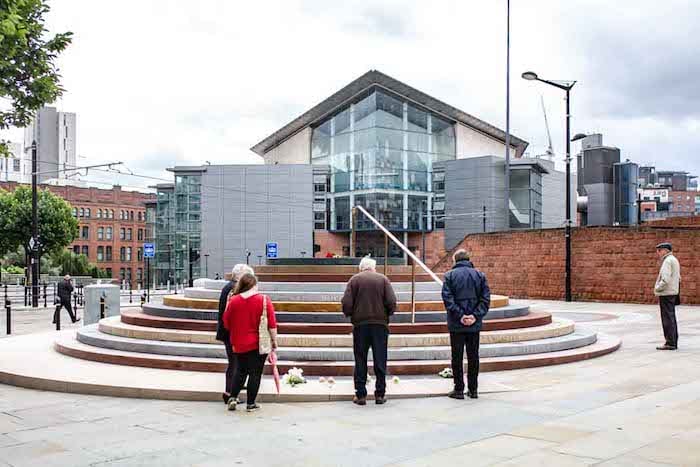
On 16 August 1819, 18 people, including four women and a child, were killed and around 700 men, women and children were seriously injured when cavalry charged into a crowd of around 60,000 people who had gathered to peacefully protest for greater parliamentary representation.
Local historian Michael Herbert has been researching, writing and running educational courses about Manchester and Salford’s radical history for 30 years. And he’s a trustee of the Working Class Movement Library and author of numerous articles and a number of books on Manchester.
From learning about early protests like the Manchester food riots of April 1812 to retracing the steps of the peaceful protesters on the day itself, Michael takes us on a trip back in time through the bloody protest for parliamentary reform.
“You can’t talk about Peterloo without talking about the radical Republican ideas of Tom Paine set out in The Rights of Man in 1791,” he told us.

“These were ideas that still terrified the authorities in 1819. Richard Carlile, for instance, due to be one of the speakers at Peterloo, was jailed for five years shortly after, just for selling Tom Paine’s work.
“I don’t think you can talk about Peterloo without talking about the acute economic distress in the years before,” he continued.
“This, for instance, led to attacks on mills in Middleton in April 1812 – in which more people were killed by the Scots Greys than at Peterloo – and an attack on The Royal Exchange Manchester the same month.
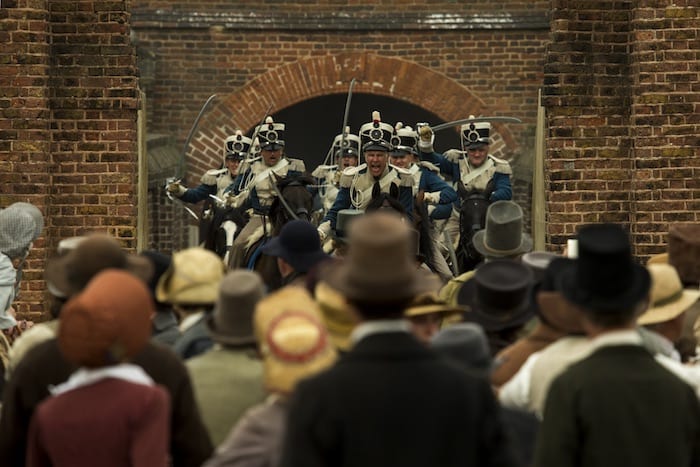
“Finally, you have to talk about the class element at Peterloo. That a small, very wealthy minority who controlled the political system were determined to maintain their privileges, if need be, by killing people in the streets – which is exactly what they did at Peterloo, with no regrets.”
Richard Cobden, who is galvanised on St Ann’s Square with a statue, was a radical figure who followed in the footsteps of the reforming zeal of the Peterloo protesters. In 1838, he founded the Anti-Corn Law League, a group set up to oppose 19th century taxes on imported wheat which led to higher bread prices.
It was opposition to unfair legislation which was a big factor behind the gathering of the crowd on the day of Peterloo.
Manchester Patriotic Union, a parliamentary reform group, had set 19th August 1819 as the date for a peaceful demonstration and speeches by well known orators like Henry Hunt.
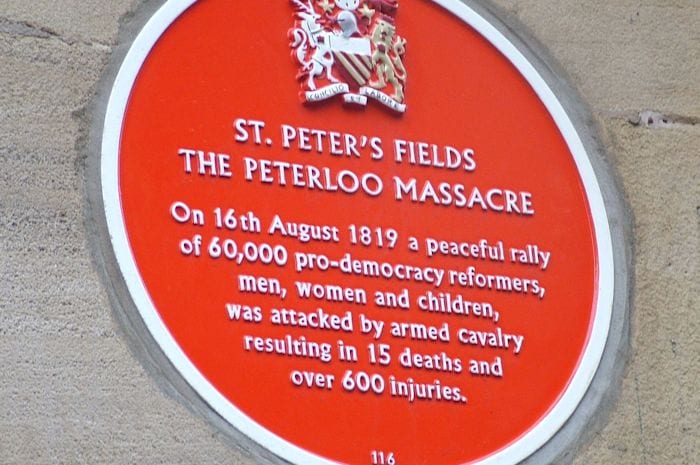
Little did they know that the estimated 60,000 innocent civilians who gathered peacefully in the area between St Peter’s Square and where Manchester Central now stands, would be subjected to a charge by armed yeomanry.
Campaigners have accused the council of a self-serving PR own goal after the £1m memorial to the Peterloo Massacre quietly went on view to the public in 2019 – just in time for the 200th anniversary – and disability rights groups pointed out it’s inaccessible to wheelchair users.
Manchester City Council since released a statement admitting they “got it wrong…”
“We have held our hands up that mistakes were made in developing the Peterloo Memorial…
“Despite the best endeavours of all involved it has not proved possible to come up with a viable solution.”
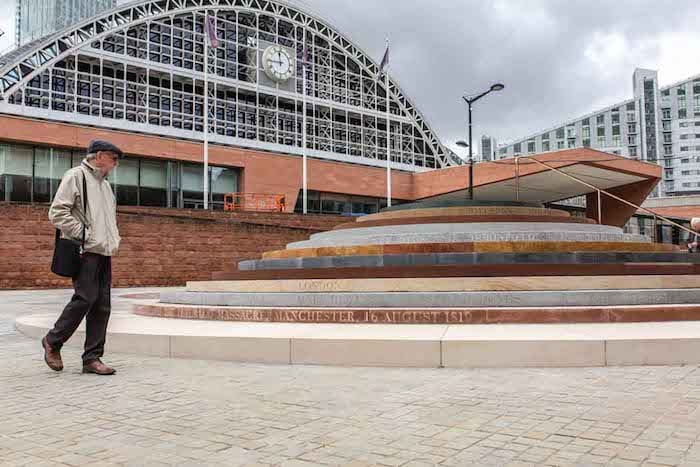
Deputy council leader Councillor Luthfur Rahman says: “We have held our hands up that mistakes were made in developing the Peterloo Memorial and that insignificant consideration was given to access issues as thinking around the design evolved.”
Michael wants to make it plain that he has no connection with the Peterloo Memorial Campaign, with whom he disagrees on the nature of the current commemoration and the Committee’s memorial.
“I think the Peterloo Memorial Committee has plucked Peterloo out of its immediate political, economic and social context, and repackaged it as a one-off event which was a milestone on the road to democracy.
“At an event which was about political reform as a response to hunger, unemployment and poverty, which has inescapable parallels with food bank Britain in 2017, they refuse to allow present day campaigners to speak at the commemoration or even carry banners.
“Rather than giving money to a static memorial it would be better spent on supporting campaigning groups in Greater Manchester – those that are fighting austerity, zero hours, benefit cuts etc. The monument should be a visible fight for a better society.”
- This article was last updated 2 years ago.
- It was first published on 15 August 2017 and is subject to be updated from time to time. Please refresh or return to see the latest version.
Did we miss something? Let us know: press@ilovemanchester.com
Want to be the first to receive all the latest news stories, what’s on and events from the heart of Manchester? Sign up here.
Manchester is a successful city, but many people suffer. I Love Manchester helps raise awareness and funds to help improve the lives and prospects of people across Greater Manchester – and we can’t do it without your help. So please support us with what you can so we can continue to spread the love. Thank you in advance!
An email you’ll love. Subscribe to our newsletter to get the latest news stories delivered direct to your inbox.
Got a story worth sharing?
What’s the story? We are all ears when it comes to positive news and inspiring stories. You can send story ideas to press@ilovemanchester.com
While we can’t guarantee to publish everything, we will always consider any enquiry or idea that promotes:
- Independent new openings
- Human interest
- Not-for-profit organisations
- Community Interest Companies (CiCs) and projects
- Charities and charitable initiatives
- Affordability and offers saving people over 20%
For anything else, don’t hesitate to get in touch with us about advertorials (from £350+VAT) and advertising opportunities: advertise@ilovemanchester.com

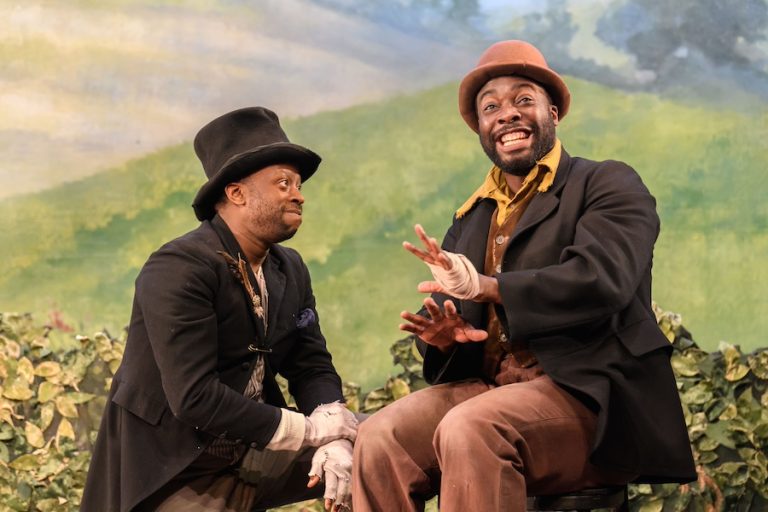
Review: Tambo & Bones at HOME is ‘ambitious, bold, gutsy…. and terrific’

Review: JB Shorts 26 at 53two is ‘a five-star showcase of northern talent’










